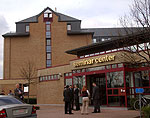|

Secretary General, General, Admiral, Ministers, Ambassadors, Ladies and gentlemen. It's a great honour for the Royal United Services Institute to have been invited to help facilitate this event and for me personally as RUSI's chairman to have the pleasure of chairing the opening session.
Our Institute is in terms of age rather a venerable body. We were founded in 1831 by the Duke of Wellington, one of whose own personal military achievements took place not so far from here, in order to promote the study of naval and military science. Since then, we have become--we like to think--the leading professional forum in Britain for those concerned with defence and security issues.
Given our country's deep commitment to the North Atlantic Alliance, we have focused our activities intensively on NATO affairs and we have sought to promote our Institute as a conduit for European and Transatlantic defence and security discourse.
Our function as an academic body is to keep in policy makers' minds the need to be open to change and to offer options for the forms which change might take. We are aware from our own experience that no institution survives by reiterating yesterday's doctrines and dogmas. It can only do so by constantly testing and updating them.
NATO has been remarkably adept at this. In the past, its critics used to occasionally to accuse it of preparing to fight yesterday's battles or to tackle yesterday's problems. But the truth is that in recent years, indeed ever since the end of the Cold Ward, NATO has been extraordinarily agile in responding to new challenges and in implementing new types of military operation. Bosnia, Kosovo, Afghanistan, have shown NATO in action. The Prague Capability Commitments, the establishment of Allied Command Transformation and the achievements of an initial NRF, demonstrate NATO's readiness to adapt its structures, its force posture and indeed its military mindset as well.
So far though much of the emphasis has been on capabilities; there is still some uncertainty about how and in what framework these capabilities are likely to be used. The NRF for example, was originally conceived as a high-intensity strike force through which to spearhead interventions in future crises inside or outside Europe. But some have suggested that it should be employed or adapted for a range of other purposes: peace support, hostage rescue, embargoes, stabilization and reconstruction missions, or even the provision of security for major public events. And there have been debates about the right balance between boots-on-the-ground and network-centric capabilities.
There is also some uncertainty about where to find the forces with which to populate the NRF and how to overcome the problems of force generation and operational funding which have bedevilled NATO deployments in Afghanistan. And beyond these military issues there are a range of political questions which the Alliance now needs to face.
At a time when the most urgent threats to our common security comes probably not from nation-states but from non-state actors in the form of loose groupings or networks, what should be the role of NATO in counter-terrorism? Where does it have assets and experience which genuinely add value? Which tasks should it lead to others? How, in preparing for a future military intervention, should NATO factor in from the outset, planning for the post-conflict phases of stabilization and reconstruction? And what relationships should it seek to build up with the civilian organisations whose contributions will be vital in this context? And lastly there is the question of the division of labour. What sorts of mission should NATO best undertake through its own military command chain? Which ones will the United States prefer to lead itself? Where would it make more sense for the European Union to take on the responsibility?
These are political challenges beyond the scope of NATO's first phase of military capability reforms but they are ones which you, Mr. Secretary General, have already begun courageously to address.
I hope that this conference can contribute further to the discussion of them and can help the process of NATO's political as well as military transformation.
Once again, it is a great honour for the Royal United Services Institute and for me personally to have been invited to take part.
| 


